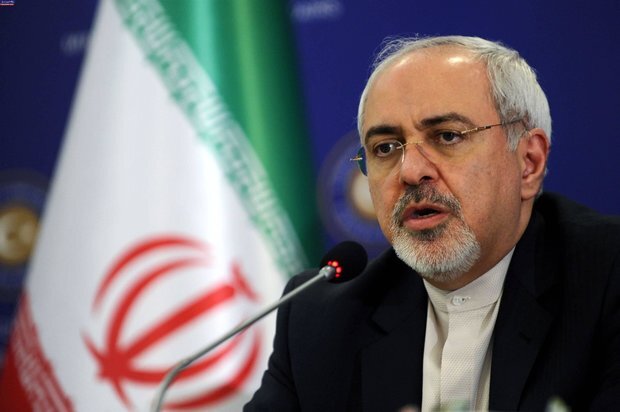Trump daydreaming of bringing Iran to negotiating table, says Zarif

TEHRAN – U.S. President Donald Trump is lost in a daydream when he says Iran will soon come to the negotiating table, says Foreign Minister Mohammad Javad Zarif.
“After exiting Barjam (nuclear deal), Trump told some Western countries to give him a few months’ time and ‘I bring Iran to the negotiating table’,” Zarif said in a televised interview on Monday night, according to Mehr.
“He has not yet backed down and says ‘if I’m (re)elected, I will bring the Iranians to the negotiating table’,” Zarif remarked, adding that the U.S. president must be daydreaming to make such remarks.
On Friday, the United States’ efforts to extend an arms embargo on Iran ended in a humiliating defeat at the UN Security Council. Only the Dominican Republic backed the U.S.-anti-Iran resolution. The vote highlighted the division between Washington and its European allies since Trump withdrew from the nuclear accord in May 2018.
Russia and China voted against the resolution. The other members, including France and Britain as permanent members of the council, and Germany refused to vote in favor of the U.S. resolution.
Following Washington’s failure at the UN Security Council, Trump announced that he intends to trigger the snapback mechanism, which would reimpose international sanctions against Iran at the United Nations.
In response, Zarif said in a tweet on Sunday that United States’ recourse to the snapback mechanism under resolution 2231 has “no leg to stand on,” as Trump has withdrawn the U.S. from the nuclear deal, officially called the Joint Comprehensive Plan of Action (JCPOA).
Zarif: Even JCPOA’s corpse defeats Washington
In his Monday night interview, the foreign minister said the U.S. is not a dominant power in the world anymore, hinting at its failure with the UNSC vote on Friday as a sign of the decline of Washington’s power.
The U.S. “killed” the JCPOA, “buried” it and held a “funeral” for it, but even the corpse of the nuclear pact defeated the United States, he stated.
Pointing to the UN Security Council’s rejection of the U.S.-drafted resolution against Iran, Zarif said the U.S. has made miscalculations in major international issues.
The chief Iranian diplomat argued that the Americans thought they could secure 9 votes, which would prompt Russia and China to veto the resolution, but it didn’t even needed those countries using their veto power.
“The United States’ resolution received two in favor votes, meaning [the U.S.] was able to convince or coerce or encourage or bribe only one country to vote in favor of its resolution,” he asserted.
According to Zarif, the fact that Russia and China voted against the resolution demonstrated the two countries’ insistence on their stance.
In a statement on Friday, Russian President Vladimir Putin proposed an online summit with the U.S., Britain, France, China, Germany and Iran in a bid to avoid “confrontation and escalation” at the UN.
“The issue is urgent,” the Russian president said, adding that the alternative was “only further escalation of tensions, increasing risk of conflict - such a scenario must be avoided.”
The call was welcomed by some countries, including China and France, but Trump dismissed it.
Also, on Monday, Beijing called on Washington to abandon its “unilateralism”, put an end to its sanctions on Iran, and adopt a correct path towards respecting the multilaterally-achieved nuclear agreement.
The U.S. needed to abandon unilateralism as well as unilateral sanctions, adopt a reasonable and realistic attitude, and return to the “right track” of observing the nuclear agreement and the United Nations Security Council decisions, Chinese Foreign Ministry spokesman Zhao Lijian said during a regular press conference on Monday.
“The voting result once again shows that unilateralism receives no support and bullying will fail. Any attempt to place one's own interest above the common interest of the international community is a dead end,” he added.
MH/PA
Leave a Comment